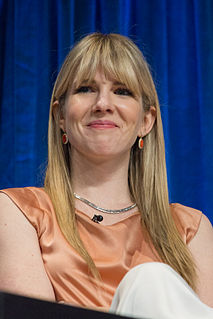A Quote by Jack Nicholson
I think that's what distinguishes Schmidt, really. In the movies now, so much of what is appealing to an audience is the dramatic or has to do with science fiction, and Schmidt is simply human. There's no melodrama; there's no device, It's just about a human being.
Related Quotes
The literature now is so opaque to the average person that you couldn't take a science-fiction short story that's published now and turn it into a movie. There'd be way too much ground work you'd have to lay. It's OK to have detail and density, but if you rely on being a lifelong science-fiction fan to understand what the story is about, then it's not going to translate to a broader audience.
Right up till the 1980s, SF envisioned giant mainframe computers that ran everything remotely, that ingested huge amounts of information and regurgitated it in startling ways, and that behaved (or were programmed to behave) very much like human beings... Now we have 14-year-olds with more computing power on their desktops than existed in the entire world in 1960. But computers in fiction are still behaving in much the same way as they did in the Sixties. That's because in fiction [artificial intelligence] has to follow the laws of dramatic logic, just like human characters.
You look at science fiction and look how often it talks about being alien, being alienated about the other. Look at the number of blue people - 'Avatar,' I'm looking at you. And it is now easier to find people of color in science-fiction literature and media, but the issues of representation are still really, really troubling.
It had also been my belief since I started writing fiction that science fiction is never really about the future. When science fiction is old, you can only read it as being pretty much about the moment in which it was written. But it seemed to me that the toolkit that science fiction had given me when I started working had become the toolkit of a kind of literary naturalism that could be applied to an inherently incredible present.
Theresa Rebeck's writing is so scarily funny. I just love how unapologetic she is with her writing: she doesn't try to make her characters likeable or heroic, she just really makes them human. Hopefully, the audience is able to love them in the end - or have whatever feelings that they want to have about all of them - but I love that she doesn't have that agenda. That is something that, as an actress, was really appealing to me; to just get to be in this group of people who are complicated and very human.
I chose the American ones, more or less the last five years of the silent era, because those are the ones that aged the best in the way they tell the story. One, it's about human beings with context. It's a very classical story with feelings, with laughter, melodrama and it really works, the good ones - Murnau's American movies, John Ford's Four Sons, King Vidor's The Crowd, or the (Josef) von Sternberg movies. You can watch it now and it still works. I mean they are really, really good pieces so this is where I tried to work.
You just did a whole read-through. The lie that brought us into war was that Iraq was a threat to us. Well, now it is a threat. Now it is a terrorist hotbed. The fiction is now reality. And now we have to deal with it. It was an attempt at a corporate takeover. This was about oil. It wasn't about human rights. It's not about human rights.
As a result of reading science fiction when I was eight, I grew up with an interest in music, architecture, city planning, transportation, politics, ethics, aesthetics on any level, art...it's just total! It's a complete commitment to the whole human race on all the Earth. That's what science fiction is about.




































